Sarah Ash's Blog, page 5
January 4, 2020
My 2019 Top Fantasy Picks for Fantasy Book Critic
I was delighted to be invited by Mihir Wanchoo of Fantasy Book Critic to choose my recommendations from 2019 – and, of course, I chose anime and manga! But looking ahead to 2020, I focused on the work of three authors whose next novels I’m really looking forward to reading (such a difficult choice, as there are many others I wanted to highlight as well). You can read what I had to say here! And do check out the lists of the other authors who’ve taken part; there are many excellent choices here for future reading.
Please Feel Free to Share:






November 25, 2019
Writing Netted – What I’d Planned and How It Worked Out by S.J. Higbee
I want to thank Sarah for inviting me to write a guest blog about my writing process. [My pleasure! Ed.] I decided rather than make it general, I’d discuss what happened during the writing of Netted, my post-apocalyptic novel set in Maine some three hundred years in the future.
For starters, Netted is not typical of my work – I generally write space opera where Earth is a long, difficult journey away and my main characters know it as a place shrouded in myth and misinformation. But I wanted to explore unintended consequences in a setting where the stakes were high but not foot-to-the-floor desperate – not at first anyway. So I decided to use a post-apocalyptic timeframe where people were struggling to put things together, rather than pulling them apart, which is always far harder to do. After years of mayhem when cannibal gangs roamed unchallenged, people are now prepared to tolerate having neural nets fitted so any lawless thoughts can be monitored and dealt with. In return for giving up their privacy and willingly offering their labour where necessary, citizens of the Community are offered protection by a standing militia, access to medical treatment, education for their children, housing and food. They are offered a future in a world where people only take what they need and anything extra goes into a communal pot to offer to those who have less. Consumerism is a dirty word, as everyone knows where that led to…
In this world, the Curlew family – Boyce, Kristen and their small son, Hardy, have survived for nearly four years out in the Blacklands, after Boyce and a pregnant Kris crash-landed their family flyer miles from Sebago, the main Community settlement in the area. They were headed for a small wilderness cabin owned by Boyce’s parents and managed to complete the journey on foot, and that’s where they’ve been living ever since, busy surviving with their three-year-old son.
I tell the story from the viewpoint of three characters. Kris Curlew, young wife and mother, who has thrived away from the confines of Sebago Hold; her mother Ginnifer Fenstrom, who bitterly regrets the final quarrel that drove her daughter to leave Sebago Hold, and takes far too many pills to dull the mental pain she endures; and Raif Curlew, father of Boyce and a rather colourful character whose trading links with the opposing regime in the area, means he is treated with suspicion by the current leadership running Sebago Hold.
I use these three characters to chart the unfolding drama that follows the discovery of the Curlew family, living safe and well in the wilderness. For their dramatic disappearance four years earlier was used by the Community leaders as an excuse to tighten security still further, so their sudden appearance is extremely inconvenient for certain powerful ambitious people.
I am a fan of unintended consequences. I studied History as my specialist subject in my teaching degree and so much of it occurs as a side-effect by accident, when those in power were aiming for something else to happen. Apart from unintended consequences, the other main theme in this book is Family. I’m always intrigued in seeing how families prevail, given it’s the most persistent human structure throughout History. How do both sets of parents cope after the loss of their children? What are their reactions on the news that their child is not only alive and well – but they now have a small grandson? Does it draw each couple closer, or drive them apart? How do other family members cope? And whatever their responses – they cannot fake how they feel, for Boyce, and particularly Kris will be able to sense their true emotions…
I really enjoyed writing this book, because while I knew exactly how it would start and the overall main plot points, I decided not to pre-plan those crucial family reactions as I knew they would unfold when I wrote the characters. While I don’t intend to write another book in this manner in the foreseeable future, it worked surprisingly well and as a result, Netted didn’t take all that long to write. I’d had another viewpoint character – Boyce. But my awesome editor, Jo Hall, felt that too much of the story was repeated and when I cut out the sections in Boyce’s viewpoint, the pacing and tension immediately improved.
Did it end up as I’d planned? No, it didn’t. Once Armstrong, the powerful Community fixer, crashed into the story and encountered Kris and Ginnifer, the story dynamic shifted into a different gear. I had intended for a tense, claustrophobic gradual unmasking of the veniality of the leadership in Sebago as the long-suffering Community citizens finally rebel. That isn’t what happened. I’m aware the cover looks quite dark and while it certainly isn’t particularly cosy – neither is it overly bleak and there are also shafts of humour throughout. In my experience, laughter and desperation go together more often people think…
I have plans to write a sequel, Netless, set in the middle of the opposing regime, which completely rejects the idea of having a neural net fitted. But right now I have at least four other books to write first. However, I definitely want to return to this world. I’d like to know what happens to my three main characters and I’d be genuinely sad if I knew for sure that I’d never again roam through this post-apocalyptic corner of Maine.
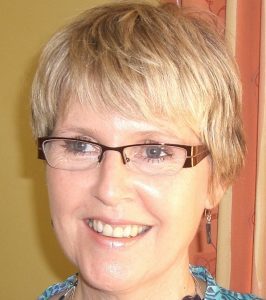
NETTED AUTHOR BIO – S.J. HIGBEE
Born the same year as the Russians launched Sputnik, Sarah confidently expected that by the time she reached adulthood, the human race would have a pioneer colony on the Moon and be heading off towards Mars. So she was at a loss to know what to do once she realised the Final Frontier wasn’t an option and rather lost her head – Sarah tried a lot of jobs she didn’t like and married a totally unsuitable man.
Now she’s finally come to terms with the fact that she’ll never leave Earth, she has a lovely time writing science fiction and fantasy novels, having recently stepped down from teaching Creative Writing at Northbrook Metropolitan College in Worthing for the past ten years. Sarah lives in Littlehampton on the English south coast with a wonderful husband and a ridiculous number of books. She can be found online chatting about books at her book review blog https://sjhigbee.wordpress.com/ and you’re very welcome to pop onto her website www.sjhigbee.com and her Facebook page https://www.facebook.com/sjhigbeeauthor/.
Please Feel Free to Share:






November 22, 2019
Netted – S.J. Higbee visits the Guest Blog to talk about her brand-new SF novel!
I’m always excited about the authors who visit the Guest Blog to talk about their writing and I’m thrilled to welcome my next guest, S.J.Higbee, to the Guest Blog on Monday November 25th. Join us then as she talks about writing Netted her latest SF novel that’s just been released!
Please Feel Free to Share:






November 9, 2019
The Arkhel Conundrum is featured in Speculative Fiction Showcase
My thanks to Jessica Rydill and Cora Buhlert for hosting a piece introducing The Arkhel Conundrum at Speculative Fiction Showcase today! (Hint: it’s a different extract from the one on the website… )
Please Feel Free to Share:






November 4, 2019
Trials and Tribulations of Self-Publishing. And the Odd Magic Moment.
I saw an episode of ‘Countryfile’ earlier this year where the presenter was taken round Agatha Christie’s garden by the author’s grandson. At one point the latter said, ‘Of course she lived in the days when all a writer had to do was write.’ The man must be a writer himself; I’m sure a lot of people still believe that that is what writers do. They write. If only…
Last year when my first book came out, I thought I knew what to expect. As the days and weeks passed I found how wrong I’d been. Going to talks, workshops and writers groups, listening to those who’d ‘been there’ just didn’t convey the reality at all. But while it would be easy to descend into a series of grumbles about all the stumbling blocks, I won’t be that self indulgent. Besides, I’d like you to carry on reading this rather than do the electronic equivalent of crushing it in your hand and tossing it in the bin. If there is an electronic equivalent, like just closing or even deleting the page, I don’t suppose it’s quite so satisfying.
It’s the self-publicising aspect that I find hardest. I’m a writer, and I’ve never been good at selling myself. Nonetheless, as the months have gone by, I find that I’m changing. To slightly misquote the Bible, to those that have, even more shall be given.
I worked in public libraries for thirty years, and St. Just, my local library, had begun holding talks, book related one way or another, organised by the Friends of St Just library. They gave me a slot, and a friend helped me set up a table with copies of my book surrounded by a rainbow scarf she’d knitted for me. (Both books have rainbows on the cover.) I had a lovely audience. Some of them I knew from writers groups, but most I didn’t. They nodded in agreement or sympathy, laughed in the right places, asked pertinent questions and some bought books at the end. So I was happy to arrange another talk, at the Morrab library in Penzance. The Morrab is that very rare thing nowadays, a subscription library, and the room where I gave my talk had floor to ceiling dark wooden shelves of books, many leather-bound, a glorious background. And to my delight it went as well as the first.
Living in the far west of Cornwall, where tourism has largely replaced fishing, mining and farming as the way to make a living, there are plenty of tourist venues which have shops and some sell books. I tried half a dozen, including two art galleries, a sculpture garden, the village centre and my favourite airport. It’s where you fly to Scilly, which takes 15 minutes. There are only two check-in desks, one passenger lounge, and they serve good coffee. Which you can drink while watching the tiny planes arrive and leave. Most planes hold 16 passengers, and a few smaller ones hold six.
But I digress. As said, I don’t do sales. I hate going in somewhere and asking if they’d like to stock my book, and also don’t like going in to see if they’ve sold any. The arrangement is that informal. Two tried for a while then decided they weren’t selling. Some do better than others; the numbers are very small, but add up over a year. Though I have to say that second time round was easier. I could go in and say they’d got my first book and would they take the second. All but the two who’d already pulled out said yes straight away. First time round, though, a massive disappointment was discovering that all the local National Trust sites, unlike in the past, have their books supplied from a central company. I approached that company and was told that if, repeat if, they took the book they would want a thousand copies. That was out, and bang went my hopes of seeing my book on the shelves at St Michael’s Mount, which is on the cover of the first book. And seeing it at the local mining centres, gardens and the forty or so other N.T. sites all across Cornwall.
As for the bookshops, I will skim lightly over that. Even the local one in Penzance, which always had a policy of promoting local authors, said no. Word is that because they have just bought new premises, they need to recoup their expenditure and unknown authors don’t point that way. But that was a bigger blow than the National Trust. All the years I’ve been here, I assumed one day I would see my book/s in their windows.
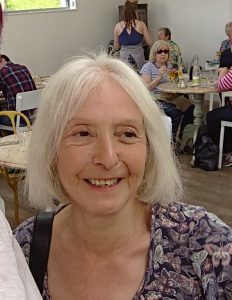
However, I did say at the head of this that there have been magic moments. I was pleased that Cornwall lending libraries bought copies of Book 1 for each of my four nearest branches, and as the issues were good they were happy to buy four of Book 2 too. I’d love to know who’s been borrowing them, but of course you don’t. Except for one woman who borrowed it from St Ives library, found my author page on Facebook – I’m the only Victoria Osborne-Broad, which helps – and put a lovely message to say how much she’d enjoyed reading it. I’ve messaged her to let her know the sequel is out there now too.
There was the day in February we were walking in Trewidden gardens, admiring the magnolias and camellias. There’s a pond where we once saw a mother duck shepherding a line of ducklings to the water. Sitting beside this pond on a bench was a woman sitting reading. She was Reading My Book. I introduced myself, signed the book, and selfies ensued. She’d bought it at Tremenheere, the sculpture garden mentioned above. At Easter, the week after Book 2 came out, the weather was glorious and we went to Tremenheere for coffee. The same woman just happened to be there, having lunch. I always keep copies of the book – both books now – in the boot of both of our cars. So she got another signed copy and we all got beaming pictures.
Back in January I made two applications. One was to the Penzance Literary Festival, or Litfest, which I’ve been attending since I stopped working for the Council eight years ago. I helped as a volunteer one year, and helped organise the volunteers another time. Which turned out to be vastly more complicated than I’d expected. But anyway I applied to them, offering to talk on the difference between what you think will happen when you get published and what actually happens. After all, some of my own expectations had come from talks and workshops at the Litfest, so I thought it was only fair to disillusion, sorry, enlighten, the next round of hopeful would-be authors.
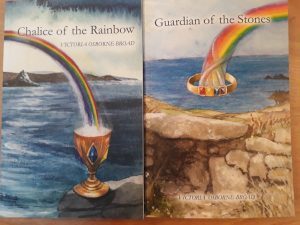
The second application was to the Holyer an Gof book awards. These are organised by the Gorsedh Kernow, Cornwall’s Bards, and are open to books about Cornwall, set in Cornwall, or written in Cornish/Kernewek. There are about a dozen categories, fiction and non-fiction. I submitted my book in January and the shortlist was announced in June. Sadly, I wasn’t short-listed, but I discovered that the awards are actually for publishers, though nominated authors get to appear and receive a certificate. And as a self published author, I qualify for attending the ceremony. So though I was very disappointed not to be nominated, I still went along, and it was an enlightening experience.
The wait wasn’t so long for the Litfest though. I was thrilled to receive an email at the end of February offering me a slot for this year’s Litfest. To add to the pleasure, the email came in during the lunch break when I was at an all day course on self publishing. So I was delighted to share the news with my fellow attendees. What the Litfest actually offered was a shared slot, with an author from east Cornwall called Darcie Baylis, who writes as DL Baylis. Her latest book is about the ghost of Daphne du Maurier haunting Menabilly, the house which Manderley in Rebecca was based on. In the story there’s a writer living at Menabilly, and both he and Daphne are having trouble with their latest books. It’s called Daphne’s Ghost, and it’s great fun.
We were paired, as her book and mine both have a supernatural element. Mine don’t have a ghost. They are set in the present day – almost, it’s 2014. So along with cars, smartphones and the internet you get magic, time travel and telepathy. As this year’s Litfest theme was Borderlines, I’ve ditched my planned complaints about all the negative sides of self-publishing, and decided to enjoy myself talking about the borderline between the real and the supernatural and what happens when, as in my books, the two collide.
The first book ends on a cliffhanger. I can say without spoiling anything that by the last page everything appears to be over. Until in the final sentence a letter arrives from someone who can’t possibly have sent a letter. Book 2 begins with the postman coming down the drive to deliver it.
So I had several people already wanting to know when Book 2 would be out. The ones immediately round here got their copies straight away. I’m not selling through Amazon any more; the warehouse costs for paperbacks were prohibitive, and Amazon keeps almost all the money from eBooks. Once Book 2 had been accepted for printing, I realised that would mean double the warehouse fees. Even without Amazon’s hefty commission, I’d have been better off just giving them all away.
I said above that I hate trying to sell by going into places and asking them. However talks are different, and I have been happily lining them up. So far this year I had one at the local W.I. and one at the local U3A. Both were enjoyable, I’ve got my name down for another W.I. and am looking for more of each within reasonable distance. There was a fringe event at the Litfest as well as the main event, and I did another talk at the lovely Morrab. I’ve also got my name down for another public library and am waiting to hear from the one which has had building works.
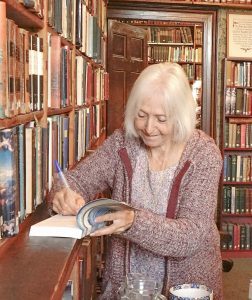
So a lot has happened in the last year. I’ve passed over most of the tedious stuff which followed my decision to be my own distributor. They included, but were not restricted to, websites to register my books with, getting my own website, getting in a stack of jiffy bags. Legal deposit copies. Set up a new bank account and taking the plunge into online banking. Arranging to put details on the site that libraries buy from. There have been so many small things I’d had no idea of. It’s like the mythical Hydra; every time you cut off one of its heads, two more would grow. That really is what it feels like.
Recently someone asked me, if I’d known beforehand what it would be like, would I have ever got started? Without a second’s hesitation I said, No. So it’s just as well I didn’t know. Because look at what I’d have missed. The heady feeling when someone tells me how much they enjoyed reading my book – and now, the second book. The stock editor at the library department spending half a minute checking the issues of book one and immediately saying yes, we’ll take the new one. The encounter in the park. And the day I was walking up the main shopping street in Penzance and a woman hailed me from the bus stop. I didn’t recognise her – I’m not good with faces at the best of times – but she said, her actual words were ‘I’m one of your fans.’ She’d been to one of my library talks last year and was sure that the sequel would be out by now.
So someone has stopped me in the street because they recognised me as an author and wanted to know if they could have my next book. It was worth all the grief.
Chalice of the Rainbow and Guardian of the Stones are now available in paperback and eBook format from my website: https://www.victoriaosborne-broad.co.uk
Please Feel Free to Share:






November 1, 2019
Victoria Osborne-Broad Returns to the Guest Blog on Monday!
I’m delighted to welcome Victoria Osborne-Broad back to the Guest Blog after the recent publication of Guardian of the Stones, the second book in her trilogy set in Cornwall.
Victoria’s going to be discussing a subject close to the hearts of many writers these days: the trials and tribulations of self-publishing!
Drop by the Guest Blog on Monday 4th November to read her thoughts…
Please Feel Free to Share:






October 24, 2019
Demons in Anime and Manga at BristolCon 2019
This Saturday (26th October) I’ll be at BristolCon discussing Demons in Anime and Manga with Zoe Burgess-Foreman in Cabot’s Cove at 11.00 a.m. Come and join the conversation!
Please Feel Free to Share:






October 23, 2019
The Arkhel Conundrum – The Tears of Artamon Book 4 Cover Reveal at Fantasy Book Critic
I’m really delighted that Mihir Wanchoo has done the honours and revealed the wonderful cover by Edward Miller for Book 4 of The Tears of Artamon: The Arkhel Conundrum at Fantasy Book Critic. Visit the site to read more… full details of the paperback edition (ebook to follow) will appear here very soon.
Please Feel Free to Share:






September 16, 2019
Saying Farewell to the Gods (and Devils and Caravaneers) of the Caravan Road: K.V. Johansen
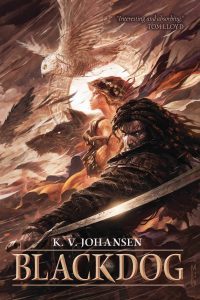 The Last Road, the final novel of Gods of the Caravan Road, comes out in October, finishing a journey that began roughly fifteen years ago. The first book, Blackdog, was published in 2011; I had written it around 2005, I think … it’s all a bit hazy now, the past. But that’s a long time to spend with a gang of people in your head. Some characters come into being due to the needs of the story; they play their part, and come or go as I want them to, and I don’t wonder what they might do in other situations — if I began to write them a new scene, I’d know, but they don’t generate stories not connected to the main plot in my head. Others, though, the ones who have been around longest or who have had much more life put into them because they are much more central to the story and have been through so many alternate drafts, feel as though they have an independent life. They’re the ones who seem like old friends who should always be there when I reach for them. Moth and Mikki, Yeh-Lin, Holla-Sayan, Ahjvar and Ghu . . . it is very strange to find myself here, realizing that it’s over. But in a way, it’s a bit of a relief, too, artistically speaking. Their stories have taken them to where they had to be. There’s a great satisfaction in the right ending.
The Last Road, the final novel of Gods of the Caravan Road, comes out in October, finishing a journey that began roughly fifteen years ago. The first book, Blackdog, was published in 2011; I had written it around 2005, I think … it’s all a bit hazy now, the past. But that’s a long time to spend with a gang of people in your head. Some characters come into being due to the needs of the story; they play their part, and come or go as I want them to, and I don’t wonder what they might do in other situations — if I began to write them a new scene, I’d know, but they don’t generate stories not connected to the main plot in my head. Others, though, the ones who have been around longest or who have had much more life put into them because they are much more central to the story and have been through so many alternate drafts, feel as though they have an independent life. They’re the ones who seem like old friends who should always be there when I reach for them. Moth and Mikki, Yeh-Lin, Holla-Sayan, Ahjvar and Ghu . . . it is very strange to find myself here, realizing that it’s over. But in a way, it’s a bit of a relief, too, artistically speaking. Their stories have taken them to where they had to be. There’s a great satisfaction in the right ending.
A story has a natural rhythm, like the turning of the year.
It turns out to be very difficult to write much about these favourite and most essential of my characters here, because … things happen, and you don’t want to know what happens until you actually read the book. I can’t talk about why I did something, without saying what I did. Their journeys through this story are not necessarily easy ones, and they don’t — can’t — come through unscathed and unchanged.
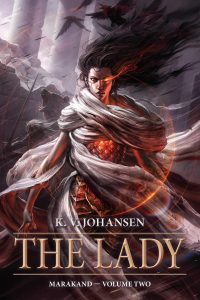
However, The Last Road isn’t only about the characters who’ve been on the journey since the beginning. New people are caught up into it, their stories only beginning. There’s a Westgrasslander woman, Jolanan, whose life becomes entangled with Holla-Sayan’s for a time. Her journey takes her into the mountains, far from the plains of her homeland and the long retreat her people are fighting there against an invader out of the west. Jolanan’s sense of self has been shaken by things that have happened to her; she’s become a person she could not have imagined only a few years before, like someone out of a winter’s tale, scarred and afraid and defeated, sometimes feeling like a deserter from the fight she thought she had chosen, even though she has never left the battle, only moved to another front. She’s in danger of falling into that bitterness that rejects or even fails to recognize the good that comes one’s way. Then there is Nikeh, an orphaned child adopted by Yeh-Lin on her travels on the western coast of the continent and raised by her to be a scholar, though one with the skillset of the Wind in the Reeds, the Nabbani empress’s spies. Nikeh, the book suggests by the inclusion of some chronicle extracts, becomes an historian, but how she gets there from the girl who once prowled the streets of Marakand fantasizing about murdering priests is a story of which we only see the start, the rest still untold. And there’s Ailan, my favourite of the three new point of view characters. He’s a young man who ends up travelling with Ahjvar, developing a serious case of hero-worship. In the end … well, in the end, Ailan is really only just at the beginning, and he’s the one new character I most regret leaving behind, because he has the potential to be so much fun.
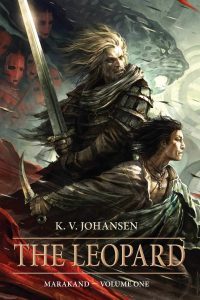
The thing about a book, though, is that when it’s over, it’s still there. It’s not like Moth and Holla-Sayan and Ghu and the rest of the gang have vanished from the world because book five has ended. They’re still there (and writing this has given me a strong wish to read The Leopard again, to watch how Ahjvar becomes the man who could take Ailan under his wing).
It’s time to move on. There are new worlds to explore, new characters to discover. And anyway, who knows? I may turn out a few of the Ahj and Ghu short stories that are still drifting around in the back of my mind. Maybe even a little “What Ahjvar and Ghu did next …” Or the one about Mikki and the young Baisirbska shaman who came to him looking for courtship advice (a scrapped tangent from Gods of Nabban). Or that disastrous encounter between Moth and Mikki and a wild god of the Salt Desert, when they were travelling to Marakand (a scrapped chapter of The Leopard). And what kind of trouble did Mikki and Holla get into on their various travels, together and solitary, between Gods of Nabban and The Last Road?
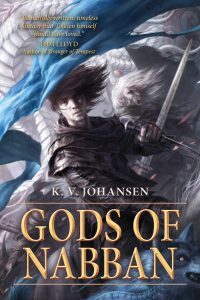
I’ve got other stories to write, other worlds and people to bring to life, but I’m pretty sure that someday, even if just for a few thousand words, I’ll find myself back on the caravan road.
Cover art for Books 1-4 is by Raymond Swanland and Book 5 The Last Road is by Jennifer Do.
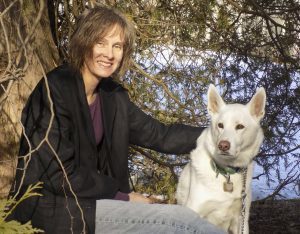
Originally from Kingston, Ontario, K.V. Johansen has an M.A. in Medieval Studies from the Centre for Medieval Studies at the University of Toronto and another, in English Literature, from McMaster, where she wrote her thesis on Layamon’s Brut, an Early Middle English epic poem. She’s been writing fantasy since childhood and has a lifelong fascination with history, archaeology, trees, and language. She also plays guitar with great determination and dedication, moderate technical skill, and to her enduring regret, an utter lack of musical talent. In addition to her secondary world fantasy for adults, she is the author of two works on the history of children’s fantasy literature, two short story collections, and a number of books for children and teens, some of which have won awards and various of which have been translated into French, Macedonian, and Danish. She lives in New Brunswick on the Bay of Fundy and spends too much time on Twitter, @kvjohansen. Her website is at www.kvj.ca.
Please Feel Free to Share:






September 13, 2019
K.V. Johansen Visits the Guest Blog to Discuss The Last Road
I’m delighted to announce that fantasy author K.V. Johansen (@KVJohansen) has written a fascinating article for the Guest Blog anticipating the publication of the fifth and final volume in her critically acclaimed fantasy series Gods of the Caravan Road in October: The Last Road.
The day? Monday September 16th – here on the Guest Blog.
Please Feel Free to Share:









